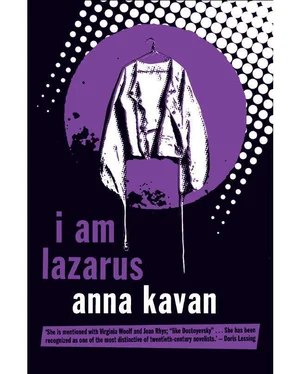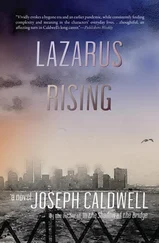Anna Kavan - I Am Lazarus
Здесь есть возможность читать онлайн «Anna Kavan - I Am Lazarus» весь текст электронной книги совершенно бесплатно (целиком полную версию без сокращений). В некоторых случаях можно слушать аудио, скачать через торрент в формате fb2 и присутствует краткое содержание. Год выпуска: 2013, Издательство: Peter Owen Publishers, Жанр: Современная проза, на английском языке. Описание произведения, (предисловие) а так же отзывы посетителей доступны на портале библиотеки ЛибКат.
- Название:I Am Lazarus
- Автор:
- Издательство:Peter Owen Publishers
- Жанр:
- Год:2013
- ISBN:нет данных
- Рейтинг книги:3 / 5. Голосов: 1
-
Избранное:Добавить в избранное
- Отзывы:
-
Ваша оценка:
- 60
- 1
- 2
- 3
- 4
- 5
I Am Lazarus: краткое содержание, описание и аннотация
Предлагаем к чтению аннотацию, описание, краткое содержание или предисловие (зависит от того, что написал сам автор книги «I Am Lazarus»). Если вы не нашли необходимую информацию о книге — напишите в комментариях, мы постараемся отыскать её.
Julia and the Bazooka
Asylum Piece
I Am Lazarus — читать онлайн бесплатно полную книгу (весь текст) целиком
Ниже представлен текст книги, разбитый по страницам. Система сохранения места последней прочитанной страницы, позволяет с удобством читать онлайн бесплатно книгу «I Am Lazarus», без необходимости каждый раз заново искать на чём Вы остановились. Поставьте закладку, и сможете в любой момент перейти на страницу, на которой закончили чтение.
Интервал:
Закладка:
I still remember the morning A came to tell me that for some unimaginable reason she had received an official notification to appear before the authorities. It was a beautiful, still sunny day and quail were calling out from the heath up above my cottage. Seeing her standing beside the door, with her hair blowing about and her bewildered face anxious in sunshine, I thought what a sad thing it was when young people got caught up in our strange official system. Elderly and middle-aged people at least have their memories to sustain them in dark times; but someone like A, a quiet young woman fond of birds, has no such inner support.
Well, in due course the case came on, and it had the distinction of being terminated quite quickly instead of dragging along in the usual inconclusive, heartbreaking way. The details, of course, were never made public. All that became known was that a verdict had been obtained against A and that she had actually started to serve her sentence. The next thing we heard, and it certainly came as a surprise, was that she had left the country. I don't mean to imply that she had escaped. We all know such a thing is impossible. But it seemed odd, to say the least of it, that, right at the beginning of her sentence, the authorities should suddenly allow her to go abroad. When I first heard about it I concluded that she was, inexplicably, being handed over to the foreign authorities. Afterwards, when I heard A's own story of what happened, I found out that no apparent restriction of any kind was placed on her movements.
She told me that she herself (rather naively) thought she was being given a reprieve. Pardons are issued by our authorities so rarely, perhaps only once in a century, that most advisors will hardly bother to apply for one: but A in her youthful optimism persuaded herself that hers was the unique case chosen to receive leniency. It seems that an official of unknown rank simply walked in one afternoon and without any explanation whatever released her and returned her belongings. Later on when she had time to go through her baggage she found everything intact, even down to some scribbled notes she had slipped into her coat pocket on the day of the final hearing. At the bank, where she went uncertainly to see if she could cash a cheque, her account was still open; in fact, a quite considerable sum had been credited to her anonymously.
You may wonder why A didn't just go home and take up her life where she had left it, since no obstacle was placed in the way of her doing so. Put yourself in her position, though, for a minute. Imagine the stares, the whispers, the veiled tentative questions, the startled or morbidly inquisitive faces which she would certainly have to encounter day after day, at her work, in the street, at a restaurant — wherever she happened to go. Imagine her relations with her superiors who, though they would hardly take the responsibility of discharging her in such anomalous circumstances, would surely regard her with a good deal of disfavour, if not with downright suspicion. What chances would she have of ultimate promotion, of success in her chosen career? And then, setting aside purely material considerations, imagine how she would stand with her friends, some of whom would doubtless cold-shoulder her, while in the company of the others she would never feel really at ease because she would never know that their association with her might not be telling against them in official quarters, or that they themselves were not, out of pity or politeness or loyalty, concealing their true feelings towards her. When all these things are taken into account her decision to go abroad isn't very surprising.
Besides, A was young and without ties and she had money to spend. Here, she thought, was a good opportunity of seeing the world and at the same time escaping from unpleasant associations. She accepted the popular fallacy that the past can be cut off like a diseased limb by the simple method of travelling a great many miles away from its locale.
It seems that she considered, the move a success. No one in the distant country could know anything about her, she was starting with a clean sheet, and for a whole year she lived there very contentedly. That is what she told me. But there is some doubt in my mind. This part of her story always seems thin and unreal, like a dream imperfectly recollected. Whenever I have questioned A about this period her replies have been strangely vague. Yes, yes, of course I was happy, she would say to me: I had got away from it all. But when I pressed her for details her thoughts seemed to wander, she would glance about restlessly, making aimless movements with her hands, and at the same time repeating, Yes, I was very happy; but in such a queer vague way that I felt still more dubious.
And how did you live? What did you do? What sort of friends did you have there? I used to go on, determined, if I could, to get something more definite out of her. But’ she never really answered these questions, just saying evasively that she hadn't done anything much, that she had lived out in the country, in an isolated place, and so had not had many chances of making friends. And then she would look awkward and become silent. And if I badgered her still further she would insist on changing the subject.
Not that I got the impression that A was concealing anything or misleading me purposely. It was rather that I felt as if she herself were uncertain; as if she couldn't remember properly what had happened; as if, perhaps, she half suspected that none of this really had happened. What was it that made her repeat over and over again in such a peculiar way the words, I was very happy then? Was it simply that what came afterwards was so much worse? Or was it a subconscious attempt to bolster up the belief that she had once, during that brief dreamlike period, actually escaped the supervision of the authorities?
For a year then, according to A's own words, she was happy in her new environment. It was a year after her arrival to the day that she received the official communication recalling her. A year to the day. How significant that is. If anything were needed to convince one that the case had never been shelved for a moment, it's just that typical instance of mechanical official routine. One can almost see some close, dismal office that is always gloomy because the windows are made either of frosted glass or glass that's so covered with dirt and cobwebs that it's no longer transparent; the walls dark with hundreds of files and ledgers; the clerks working at their desks, or, more likely, lounging and gossiping near the stove at the end of the room, totally indifferent to all the suspense and suffering and despair centered around them.
It must have been a dreadful shock to A to receive this message after a whole year of apparent security. And yet I wonder whether it really was such a surprise to her? Whether she had not been half expecting something of the sort all the time, and whether she was not, in some part of herself, almost glad when the blow actually fell?
The first thing she did was to hurry to the main seaport, which was not far away, to make arrangements for her return. People to whom she spoke on the journey were pessimistic about her chances of getting a passage. In fact, they seem to have done their best to discourage her by talking about the difficulty of obtaining a passport, the infrequent sailings, and the inadequate passenger accommodation, most of which was automatically reserved for the great numbers of officials who were always travelling about. It was a thoroughly bad start to a bad business, and A was most apprehensive when she arrived at her destination. But here everything turned out unexpectedly simple. Just as often happens when one anticipates insuperable difficulties, all obstacles mysteriously melted away. She entered the department where she had to make her first application feeling diffident and depressed and wondering what sort of treatment she would receive from the officials who doubtless knew all about her case. To her astonishment the whole affair went through with perfect smoothness and speed. The clerks in the outer office spoke politely to her and, instead of following their usual practice of whispering and tittering together while the visitor cools his heels helplessly on the other side of the barrier, they announced her at once.
Читать дальшеИнтервал:
Закладка:
Похожие книги на «I Am Lazarus»
Представляем Вашему вниманию похожие книги на «I Am Lazarus» списком для выбора. Мы отобрали схожую по названию и смыслу литературу в надежде предоставить читателям больше вариантов отыскать новые, интересные, ещё непрочитанные произведения.
Обсуждение, отзывы о книге «I Am Lazarus» и просто собственные мнения читателей. Оставьте ваши комментарии, напишите, что Вы думаете о произведении, его смысле или главных героях. Укажите что конкретно понравилось, а что нет, и почему Вы так считаете.












